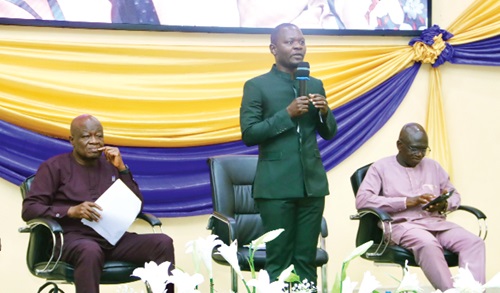
Let's develop rural education policy - GNAT Research Director advocates
The Director of Research of Ghana National Association of Teachers (GNAT) Institute of Research and Industrial Relations Studies (IRIRS), Dr Linus Linnaeus Tannor, has called for the establishment of a policy to guide education delivery in rural areas.
"We keep talking about teachers in deprived areas, we keep talking about allowances for them but we do not have a standardised definition of the rural area, so, if we don’t know where they are how do we count them," he said.
Dr Tannor said this when he spoke on the theme: Community Mobilisation for Education at the 76th New Year School at the University of Ghana, Legon yesterday.
He underscored the need for the setting up of a National Community Education Development Fund to help communities that had initiated projects on their own as far as education was concerned.
Reporting system
In addition, he advocated the setting up of a community education reporting system.
Currently, he said there was no system that was monitoring the interventions that communities were introducing in the area of education, hence the need to have such a system in place.
"I propose that we should revisit and revitalise school management committees and parent-teacher-associations.
Throwing further light on his call, Dr Tannor said the dynamics in a rural environment were so complex and that if the country wanted to transform rural education, there was the need for a full policy on rural education.
South Africa, for example, he said, had a policy on rural education.
"I think the Ministry of Education made attempts through the Ghana Education Service to standardise even the operationalisation of the term ‘rural’.
"Others will call it rural, others will call it deprived and underserved, so even we need a standardised definition of a rural area.
It is by so doing that we can even know the number of schools that are in the rural areas, the number of teachers in the rural areas," he emphasied.
Dynamics
Dr Tannor said the dynamics in the rural environment went beyond monetary incentives
He said although having a rural teacher allowance was good, the challenges in the rural setting went far beyond monetary incentives.
He also cited the issues of accommodation facilities for teachers, among other things, that needed to be captured to facilitate teaching and learning in the rural areas.
Community mobilisation, he said, was not an event but a process.
He said community mobilisation was important to address issues such as untrained teachers, particularly within rural communities and teenage pregnancy.
He said community mobilisation involved the conduct of a needs assessments, where the needs of a school or community were first identified.
After identifying the needs, he said there was the need to look at the resources that were available within the community that could be used to rectify the challenge in the area.
"Until the community does something for itself, the community will not go outside to look for help," he said.
Awareness
Commenting on barriers to community mobilisation, he said the first one was lack of awareness and understanding because there was a gap between the community and the school.
"So, for example, you're a head teacher, you've been posted to a new school, the first thing is to do community entry.
Please go to the opinion leaders, introduce yourself to them, but if there is that weak linkage, then it will be difficult to mobilise within that community," he said.
Another major challenge of community mobilisation, Dr Tannor said, had to do with the lack of expertise in lobbying and proposal writing.
"You would observe that when it comes to the needs of the communities that are beyond their resources, you need to seek external help, and this external help may come in the form of writing proposals to donors"
Solutions
To address some of challenges at the community level, Dr Tannor said there should be capacity-building for teachers, head teachers, non-governmental organisations and community leaders in advocacy, lobbying, and proposal writing.
He also recommended that every school should have a community profile booklet developed as a joint venture between the community and the school.
"The community profile booklet will talk about the assets of the community, its resources and its needs, and what the community has been able to do using its own resources, then it can approach donors using the community profile booklet as a proposal," he said.
The operationalisation of the school opening day initiatives and incorporating local knowledge into the curriculum, among others, he said, were also important and that "We would only appreciate our curriculum only when we have local content in the curriculum".
